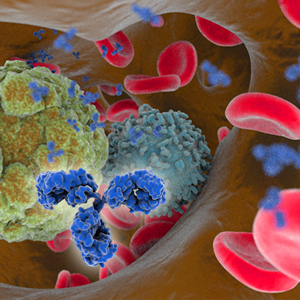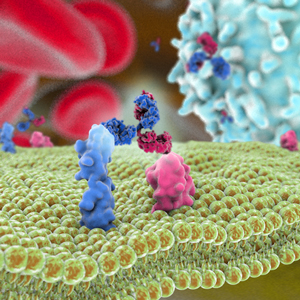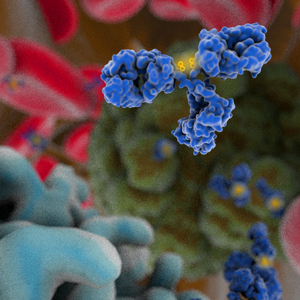 The pace of antibody therapeutics development accelerated in 2017, and this faster pace is projected to continue through 2018. Notably, the annual number of antibody therapeutics granted a first approval in either the European Union (EU) or United States (US) reached double-digits (total of 10) for the first time in 2017. The 10 antibodies granted approvals are: brodalumab, dupilumab, sarilumab, guselkumab, benralizumab, ocrelizumab, inotuzumab ozogamicin, avelumab, duvalumab, and emicizumab. Brodalumab, however, had already been approved in Japan in 2016.
The pace of antibody therapeutics development accelerated in 2017, and this faster pace is projected to continue through 2018. Notably, the annual number of antibody therapeutics granted a first approval in either the European Union (EU) or United States (US) reached double-digits (total of 10) for the first time in 2017. The 10 antibodies granted approvals are: brodalumab, dupilumab, sarilumab, guselkumab, benralizumab, ocrelizumab, inotuzumab ozogamicin, avelumab, duvalumab, and emicizumab. Brodalumab, however, had already been approved in Japan in 2016.
As of mid-December 2017, 10 antibody therapeutics (ibalizumab, burosumab, tildrakizumab, caplacizumab, erenumab, fremanezumab, galcanezumab, romosozumab, mogamulizumab, cemiplimab) were in regulatory review in the EU or US, and regulatory actions on their marketing applications are expected by the end of 2018.
Based on company announcements and estimated clinical study primary completion dates, and assuming the study results are positive, marketing applications for at least 13 antibody therapeutics that are now being evaluated in late-stage clinical studies may be submitted by the end of 2018. Of the 13 candidates, 8 are for non-cancer indications (lanadelumab, crizanlizumab, ravulizumab, eptinezumab, risankizumab, satralizumab, brolucizumab, PRO140) and 5 are for cancer (sacituzumab govitecan, moxetumomab pasudotox, cemiplimab, ublituximab, isatuximab).
Additional antibody therapeutics to watch in 2018 include 19 mAbs undergoing evaluation in late-stage studies with primary completion dates in late 2017 or during 2018. Of these mAbs, 9 are for non-cancer indications (lampalizumab, roledumab, emapalumab, fasinumab, tanezumab, etrolizumab, NEOD001, gantenerumab, anifrolumab) and 10 are for cancer indications (tremelimumab, isatuximab, BCD-100, carotuximab, camrelizumab, IBI308, glembatumumab vedotin, mirvetuximab soravtansine, oportuzumab monatox, L19IL2/L19TNF). Positive clinical study results may enable marketing application submissions in 2018. Brief summaries of these antibody therapeutics are provided in the ‘Antibodies to watch in 2018’ article, which is now available on the mAbs website. A PDF of this open-access article is available here.
Emicizumab granted FDA approval
 Emicizumab (Hemlibra, emicizumab-kxwh, ACE910, RO5534262), a bispecific IgG4 mAb targeting Factors IXa and X, was approved by the FDA on November 16, 2017. The drug, which is administered once a week, was approved to prevent or reduce the frequency of bleeding episodes in adult and pediatric patients with hemophilia A who have developed Factor VIII inhibitors. The biologics license application was granted Priority Review and a Breakthrough Therapy designation. Hemlibra was also granted an orphan drug designation by the FDA.
Emicizumab (Hemlibra, emicizumab-kxwh, ACE910, RO5534262), a bispecific IgG4 mAb targeting Factors IXa and X, was approved by the FDA on November 16, 2017. The drug, which is administered once a week, was approved to prevent or reduce the frequency of bleeding episodes in adult and pediatric patients with hemophilia A who have developed Factor VIII inhibitors. The biologics license application was granted Priority Review and a Breakthrough Therapy designation. Hemlibra was also granted an orphan drug designation by the FDA.
Marketing applications for emicizumab are under review in the European Union and Japan; the European Medicines Agency is reviewing the marketing authorization application under accelerated assessment. Emicizumab was granted an orphan drug designation in Japan for the prevention and reduction of bleeding episodes in patients with congenital factor VIII deficiency with inhibitors. The drug was created by Chugai Pharmaceutical Co., Ltd. and co-developed by Chugai, Roche and Genentech.
The marketing applications for emicizumab include results from the Phase 3 HAVEN 1 (NCT02622321) study and interim analysis of the HAVEN 2 (NCT02795767) study. In the HAVEN 1 study, adult and adolescent patients (12 or older) who had previously received episodic treatment with bypassing agents were randomly assigned in a 2:1 ratio to emicizumab prophylaxis (group A) or no prophylaxis (group B). The primary end point of the study was the difference in bleeding rates between Group A and Group B. Emicizumab was administered subcutaneously at a dose of 3 milligrams per kilogram per week (mg/kg/week) for 4 weeks followed by 1.5 mg/kg/week up to the end of the study. The annualized bleeding rate in Group A was reduced by 87% compared to Group B (2.9 events vs 23.3 events, P<0.001). [1] The HAVEN 2 study is evaluating the efficacy, safety, and pharmacokinetics of subcutaneous administration of emicizumab in hemophilia A pediatric patients with inhibitors.
1. Oldenburg J, Mahlangu JN, Kim B, Schmitt C, Callaghan MU, Young G, Santagostino E, Kruse-Jarres R, Negrier C, Kessler C, et al. Emicizumab prophylaxis in hemophilia A with inhibitors. N Engl J Med. 2017;377(9):809-818. doi: 10.1056/NEJMoa1703068.
The Antibody Society maintains a comprehensive table of approved antibody therapeutics and those in regulatory review in the EU or US. As of November 16, 2017, a total of 10 mAbs have been granted first approvals in either the US or EU in 2017, and marketing applications for a total of 9 antibody therapeutics that have not yet been approved in either the EU or US are undergoing review in these regions.
Please log in to access the table, located in the Members Only section.
Not a member? Please join! Membership is free for students and employees of the Society’s corporate sponsors.
First approval for guselkumab
 On July 13, 2017, the Food and Drug Administration (FDA) approved the biologics license application for guselkumab (TREMFYA). The product, a human IgG1 monoclonal antibody targeting interleukin-23, is indicated for the treatment of patients with moderate-to-severe plaque psoriasis who are candidates for systemic therapy or phototherapy. Approval was based on results from a clinical development program that included more than 2,000 patients in the Phase 3 VOYAGE 1, VOYAGE 2 and NAVIGATE studies. Guselkumab was generated using MorphoSys’ Human Combinatorial Antibody Library technology.
On July 13, 2017, the Food and Drug Administration (FDA) approved the biologics license application for guselkumab (TREMFYA). The product, a human IgG1 monoclonal antibody targeting interleukin-23, is indicated for the treatment of patients with moderate-to-severe plaque psoriasis who are candidates for systemic therapy or phototherapy. Approval was based on results from a clinical development program that included more than 2,000 patients in the Phase 3 VOYAGE 1, VOYAGE 2 and NAVIGATE studies. Guselkumab was generated using MorphoSys’ Human Combinatorial Antibody Library technology.
As of July 13, guselkumab is the eighth antibody therapeutic to be granted a first marketing approval in any country in 2017, following the approvals of brodalumab, avelumab, ocrelizumab, dupilumab, durvalumab, sarilumab and inotuzumab ozogamicin. The Antibody Society maintains a comprehensive table of approved antibody therapeutics and those in regulatory review in the EU or US. As of July 13, 2017, marketing applications for a total of nine antibody therapeutics that have not been approved in any country are undergoing review in the EU or US. In addition, a marketing application for the antibody-drug conjugate gemtuzumab ozogamicin, which was approved in 2000 by the US FDA and subsequently withdrawn from the US market, is undergoing review in the EU and US.
Please log in to access the table, located in the Members Only section.
Not a member? Please join!
Membership is free for students and employees of the Society’s corporate sponsors.
First approval for inotuzumab ozogamicin in the European Union
 The European Commission has granted a marketing approval for the antibody-drug conjugate (ADC) inotuzumab ozogamicin (BESPONSA) as monotherapy for the treatment of adults with relapsed or refractory CD22-positive B-cell precursor acute lymphoblastic leukemia (ALL). Inotuzumab ozogamicin is a CD22-targeting humanized IgG4 antibody conjugated to the drug calicheamicin via an acetyl butyrate linker. The approval of BESPONSA was supported by results from the Phase 3 INO-VATE ALL trial (ClinicalTrials.gov number NCT01564784), which compared the effects of either inotuzumab ozogamicin or standard intensive chemotherapy in adults with relapsed or refractory ALL Results of this study were published in The New England Journal of Medicine in 2016. A biologics license application for inotuzumab ozogamicin for the treatment of adult patients with relapsed or refractory B-cell precursor ALL is undergoing a priority review by the US Food and Drug Administration (FDA); the goal date for their decision is in August 2017.
The European Commission has granted a marketing approval for the antibody-drug conjugate (ADC) inotuzumab ozogamicin (BESPONSA) as monotherapy for the treatment of adults with relapsed or refractory CD22-positive B-cell precursor acute lymphoblastic leukemia (ALL). Inotuzumab ozogamicin is a CD22-targeting humanized IgG4 antibody conjugated to the drug calicheamicin via an acetyl butyrate linker. The approval of BESPONSA was supported by results from the Phase 3 INO-VATE ALL trial (ClinicalTrials.gov number NCT01564784), which compared the effects of either inotuzumab ozogamicin or standard intensive chemotherapy in adults with relapsed or refractory ALL Results of this study were published in The New England Journal of Medicine in 2016. A biologics license application for inotuzumab ozogamicin for the treatment of adult patients with relapsed or refractory B-cell precursor ALL is undergoing a priority review by the US Food and Drug Administration (FDA); the goal date for their decision is in August 2017.
As of July 1, inotuzumab ozogamicin is the seventh antibody therapeutic to be granted a first marketing approval in any country in 2017, following the approvals of brodalumab, avelumab, ocrelizumab, dupilumab, durvalumab, and sarilumab. The Antibody Society maintains a comprehensive table of approved antibody therapeutics and those in regulatory review in the EU or US. As of July 1, 2017, marketing applications for a total of 10 antibody therapeutics that have not been approved in any country are undergoing review in the EU or US. In addition, a marketing application for the ADC gemtuzumab ozogamicin, which was approved in 2000 by the US FDA and subsequently withdrawn from the US market, is undergoing review in the EU and US.
Please log in to access the table, located in the Members Only section.
Membership is free for students and employees of the Society’s corporate sponsors.
The source infix is out!
 The World Health Organization (WHO) issues International Nonproprietary Names (INN) for therapeutic antibodies. These INNs contain the suffix –mab preceded by a source (or species) infix such as -xi- for chimeric, -zu- for humanized and -u- for human antibodies. Changes in definitions and procedures, which WHO implemented in 2014, resulted in INN with inconsistent source designations for an array of chimeric and humanized antibodies. Discussions spearheaded by The Antibody Society have now led to a resolution of the issue. At the 64th Consultation on INN held in April 2017, the WHO INN expert group decided to eliminate the source infix. Although the change was officially announced today, WHO implemented the changes promptly and applicants have already received INN issued under the new naming scheme, i.e., without an INN source infix. The Antibody Society board members Paul W.H.I. Parren, Paul J. Carter and Andreas Plückthun provide analysis and more information in a Perspective article that will be published in the upcoming August/September 2017 issue of mAbs. Society members will be alerted by email when this article is available for downloading from the ‘Latest Articles’ section of the mAbs website.
The World Health Organization (WHO) issues International Nonproprietary Names (INN) for therapeutic antibodies. These INNs contain the suffix –mab preceded by a source (or species) infix such as -xi- for chimeric, -zu- for humanized and -u- for human antibodies. Changes in definitions and procedures, which WHO implemented in 2014, resulted in INN with inconsistent source designations for an array of chimeric and humanized antibodies. Discussions spearheaded by The Antibody Society have now led to a resolution of the issue. At the 64th Consultation on INN held in April 2017, the WHO INN expert group decided to eliminate the source infix. Although the change was officially announced today, WHO implemented the changes promptly and applicants have already received INN issued under the new naming scheme, i.e., without an INN source infix. The Antibody Society board members Paul W.H.I. Parren, Paul J. Carter and Andreas Plückthun provide analysis and more information in a Perspective article that will be published in the upcoming August/September 2017 issue of mAbs. Society members will be alerted by email when this article is available for downloading from the ‘Latest Articles’ section of the mAbs website.
Like this post, but not a member? Please join!
Membership is free for employees of the Society’s corporate sponsors.

